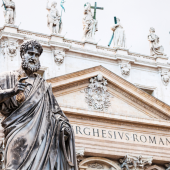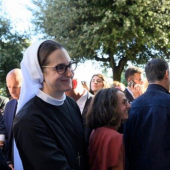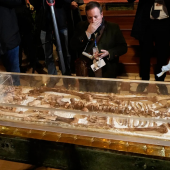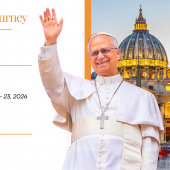‘Online Mass’ not a substitute to physical attendance in liturgy, warns Vatican official
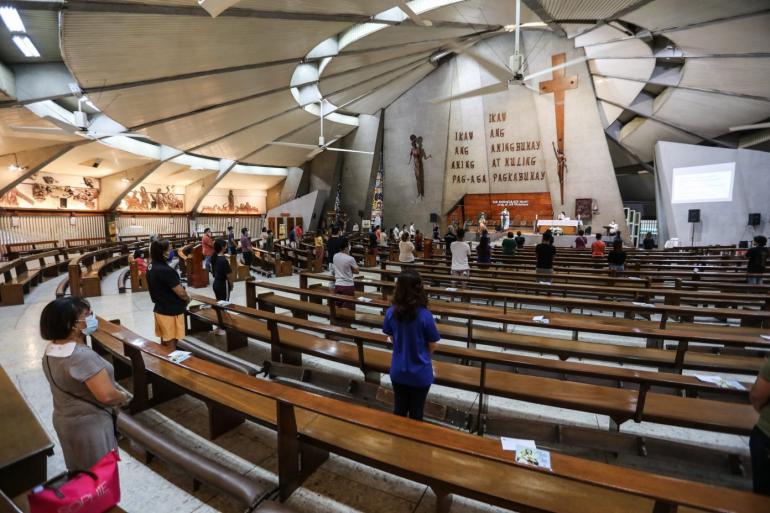
Attending an online celebration of the Holy Eucharist is not a substitute to the physical presence of the faithful during the liturgy.
In a Letter to the presidents of Episcopal Conferences, the Vatican’s Congregation for Divine Worship stressed the need to return to the “normality of Christian life” if the local health situation permits.
Cardinal Robert Sarah, prefect of the Congregation for Divine Worship and the Discipline of the Sacraments, said “virtual” services cannot compare to, and cannot replace, personal participation in the liturgy.
The letter titled “Let us return to the Eucharist with joy!” was published with the approval of Pope Francis on September 3.
The letter said that “as soon as circumstances permit … it is necessary and urgent to return to the normality of Christian life, which has the church building as its home and the celebration of the liturgy.”
“Aware that God never abandons the humanity He has created, and that even the hardest trials can bear fruits of grace, we have accepted our distance from the Lord’s altar as a time of Eucharistic fasting,” said Cardinal Sarah in the letter.
He said the time without physical attendance in Masses was “useful for us to rediscover its vital importance, beauty and immeasurable preciousness.”
The cardinal, however, said that “as soon as is possible, we must return to the Eucharist … with an increased desire to meet the Lord, to be with Him, to receive Him and to bring Him to our brothers and sisters with the witness of a life full of faith, love and hope.”
He stressed that “no broadcast is comparable to personal participation or can replace it” even as he recognized that the means of communication performed a “valued service to the sick and those who are unable to go to church.”
He said online celebrations “have performed a great service in the broadcast of Holy Mass at a time when there was no possibility of community celebrations.”
The cardinal, however, said that liturgies in which the faithful participate only virtually “risk distancing us from a personal and intimate encounter with the incarnate God” whose presence among His people “was not virtual but real.”
“This physical contact with the Lord is vital, indispensable, irreplaceable,” he said.
The church leader encouraged bishops and priests that once concrete measures that can be taken to reduce the spread of the virus to a minimum have been identified and adopted, “it is necessary that all resume their place in the assembly of brothers and sisters.”
He warned against reducing the participation of the faithful in the celebration of the Eucharist to a “gathering.”
He said it should not be considered “comparable or even subordinate to forms of recreational activities,” adding that civil authorities cannot legislate on liturgical norms.
The letter noted that the pandemic has produced “upheavals” not only in social and familial relationships, “but also in the life of the Christian community, including the liturgical dimension.”
“This community dimension has a theological meaning: God is a relationship of Persons in the Most Holy Trinity,” wrote Cardinal Sarah.
He said God “puts Himself in relationship with man and woman and calls them in turn to relationship with Him.”
The letter noted that while pagans built temples to various deities, “Christians, as soon as they enjoyed freedom of worship, immediately built places that were the domus Dei et domus ecclesiae.”
Cardinal Sarah said this is where the faithful can recognize themselves as the “community of God.”
“The house of the Lord presupposes the presence of the family of the children of God,” he said.
In his letter, the cardinal said the Christian community “has never sought isolation and has never made the Church a city with closed doors.”
“Formed in the value of community life and in the search of the common good, Christians have always sought insertion into society.”
The cardinal noted that even in the midst of the pandemic, “a great sense of responsibility has emerged.” - LiCAS.news
Radio Veritas Asia (RVA), a media platform of the Catholic Church, aims to share Christ. RVA started in 1969 as a continental Catholic radio station to serve Asian countries in their respective local language, thus earning the tag “the Voice of Asian Christianity.” Responding to the emerging context, RVA embraced media platforms to connect with the global Asian audience via its 21 language websites and various social media platforms.










